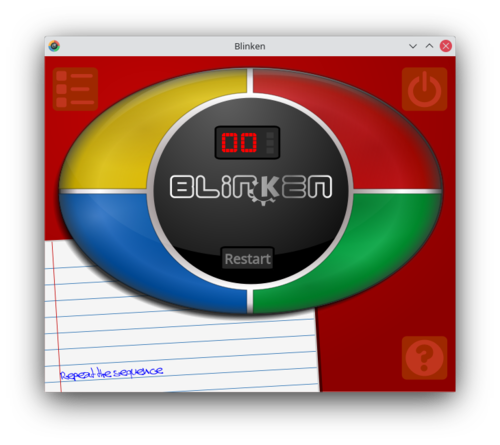BlinKen/es: Difference between revisions
GabrielYYZ (talk | contribs) (Created page with "==Descripción==") |
GabrielYYZ (talk | contribs) (Created page with "'''Blinken''' se basa en un juego electrónico publicado en 1978, que desafía a los jugadores a recordar secuencias cada vez mas largas.") |
||
| Line 14: | Line 14: | ||
==Descripción== | ==Descripción== | ||
'''Blinken''' | '''Blinken''' se basa en un juego electrónico publicado en 1978, que desafía a los jugadores a recordar secuencias cada vez mas largas. | ||
On the face of the device, there are 4 different color buttons, each one with their own distinctive sound. These buttons light up randomly, creating the sequence that the player must then recall. If the player is successful in remembering the sequence of lights in the correct order, they advance to the next stage, where an identical sequence with one extra step is presented. If they are incorrect, the game is lost, and the player must start again from the beginning. | On the face of the device, there are 4 different color buttons, each one with their own distinctive sound. These buttons light up randomly, creating the sequence that the player must then recall. If the player is successful in remembering the sequence of lights in the correct order, they advance to the next stage, where an identical sequence with one extra step is presented. If they are incorrect, the game is lost, and the player must start again from the beginning. | ||
Revision as of 22:46, 3 December 2010
Home » Applications » Education » es

|
Blinken es nuestra versión del conocido juego "Simón dice".
Es parte del Proyecto de Educación KDE. |

Descripción
Blinken se basa en un juego electrónico publicado en 1978, que desafía a los jugadores a recordar secuencias cada vez mas largas.
On the face of the device, there are 4 different color buttons, each one with their own distinctive sound. These buttons light up randomly, creating the sequence that the player must then recall. If the player is successful in remembering the sequence of lights in the correct order, they advance to the next stage, where an identical sequence with one extra step is presented. If they are incorrect, the game is lost, and the player must start again from the beginning.
The goal is to get a high score - each step in the sequence is worth one point, so correct entry of a sequence of 8 lights is worth 8 points on the high score table.
